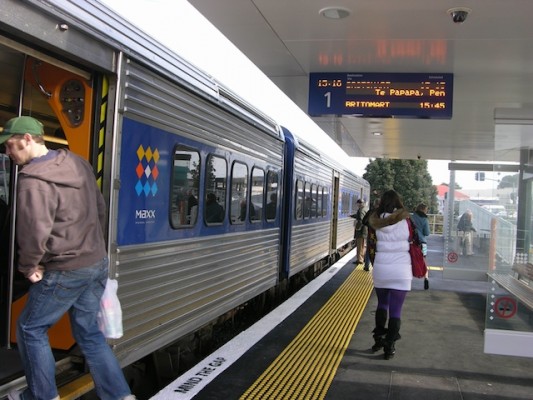New Transport Strategy Work Starts
in General Motorways by Jon C — October 20, 2010 at 5:28 pm | 6 comments
The ministry of transport’s annual report was tabled in parliament this afternoon and reveals that a new transport strategy document is on its way.
The report says that the last NZ transport strategy New Zealand was published in August 2008 and provided a clear statement of the previous government’s direction for transport over a 30 year period to 2040.
“The current government in general terms supports the overall intent of the NZTS, but considers that moving too quickly on modal shift will have a negative impact on economic efficiency.
“The government will develop a forward plan for transport to meet its economic growth goals.To assist in the development of the forward plan the Ministry is analysing strategic trends and issues on an ongoing basis and developed a paper for the Minister to initiate a debate in Cabinet about the longer-term direction for the transport sector.”
Work has begun on the next Government Policy Statement for Land Transport Funding to be released at the end of June 2011. The Government Policy Statement is the policy lead document for the allocation of funding for land transport projects, which will feed into the funding allocation for the next three-year National Land Transport Programme, to be published by the NZ Transport Agency in June 2012
The Ministry report says it has “reduced its staffing level while taking on new responsibilities such as rail policy advice. Some positions were disestablished as a result of the reorganisation and the Ministry has maintained the selective non-replacement recruitment policy approach adopted in 2008/09. The Ministry’s FTE count has reduced from 182 in June 2008 to 167 FTE in June 2010 and is on track to reach its target of 162 FTE by June 2011.”

Boarding at Onehunga this afternoon
On rail, there is no fresh news.
It describes the year for the ministry concerning rail activities as:
Metro rail operating model: During the 2009/10 year the metro rail operating model for Auckland and Wellington regions was developed and agreed by Cabinet. Work has begun on implementing parts of the operating model, such as establishing track access charges for both metro rail and the freight business, improving the performance of the two present metro rail operating contracts, and assisting with the public transport revenue modelling project to determine appropriate fare and subsidy levels.
National rail network: The Ministry worked with the Treasury to conduct a due diligence exercise on the KiwiRail Group Turnaround Plan. A detailed monitoring framework for the Turnaround Plan and rail-related appropriation was developed. The Ministry developed, in conjunction with the Crown Organisation Monitoring Unit, a manual for the monitoring and accountability framework for the KiwiRail Group.
Auckland Metro rail: During the 2009/10 year, Cabinet approved a $500 million appropriation to develop new infrastructure and purchase new electric multiple units. The Ministry worked with regional stakeholders to develop a financial model that will help determine metro rail costs and revenue forecasts. The electrification of the Auckland network will help reduce congestion by providing more frequent trains at peak times.
Of financial issues, the report states that New Zealand continues to experience a challenging fiscal environment.
“We are committed to doing our best to ensure the Ministry delivers value for money, and does not make demands for additional funds during this difficult period. Over the three years from 2008/09, the Ministry’s departmental funding will decrease by nearly $4 million.”
Tags: Ministry of TYransport












6 Comments
Got a link to the document Jon?
@jarbury
http://www.parliament.nz/NR/rdonlyres/5EB0AF4E-3B39-455C-8CF5-219843EF7EBD/163547/DBHOH_PAP_20643_TransportMinistryofTeManatWakaAnnu.pdf
cheers
Sounds like they will craft a document pro-roads. I hope the roading, trucking and road construction lobbies donated large sums to the National Party again.
Perhaps a public enquiry into donations received by the National Party by these lobbies is called for?
“moving too quickly on modal shift will have a negative impact on economic efficiency” - How exactly? Why will unclogging our roads by encouraging more people and freighton to fast and more fuel efficient means of transport have a negative effect on our economy. There is no logic in that statement.
Cam, “economic efficiency” may mean “political donations”?
The old document was weak enough by giving targets for 2040 only (i.e. around 2035 someone could say “Ooops, doesn’t look like we will make it…”) so I wonder how they can weaken that even more. I mean, strategies get ignored anyway if they aren’t liked.
Maybe Joyce will do what he did on safer roads, and try to have targets removed totally, switching to a document that is ALL talk, rather than just 90% talk.